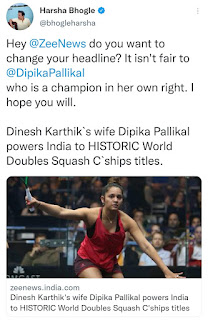Inferior: How Science Got Women Wrong and the New Research That's Rewriting the Story, 2017
As a woman who speaks about gender equity, I am often gaslighted by people saying "but you cannot deny that there is an intrinsic difference between men and women. Women are meant to be nurturers. Why would you want to claim equality when you are actually superior."
While my response to them is to attempt to explain that except child bearing and lactation, everything else is gender agnostic, 'Inferior' adds to my arsenal by giving evidence that the psychological differences that we see are largely shaped by culture and not biology.
Everything that Angela Saini says in the book, Inferior, is in public domain. What she does it put it all together in one place in a manner that is easy to digest and refer to later. The chapter I particularly liked was on Women, the Gatherer, where she gives examples to show that even in hunting, which is considered the one profession that was the exclusive preserve of men, women were more effective in bringing home a regular source of hunted meat.
It was almost frustrating to read about the sexist attitude of people like Charles Darwin who really should have known better-
"I certainly think that women, though generally superior to men [in] moral qualities are inferior intellectually, and there seems to me to be a great difficulty from the laws of inheritance (if I understand these laws rightly) in their becoming the intellectual equals of man."
You can feel her pain when she says, about how women in science-
"science has failed to rid us of the gender stereotypes and dangerous myths we've been laboring under for centuries. Women are so grossly underrepresented in modern science because, for most of history, they were treated as intellectual inferiors and deliberately excluded from it. It should come as no surprise, then, that this same scientific establishment has also painted a distorted picture of the female sex. This, in turn again, has skewed how science looks and what it says even now."
While she talks at length about science, the same holds true in almost every profession. Women need to overcome many invisible challenges to enter and compete in most professions- to then use the fact that women are underrepresented to draw the conclusion that women are not suitable for the profession is an insidious self-reinforcing fallacy.
Angela Saini calls out the establishment that selectively uses data that reinforces their claims, while underplaying data that could discredit it. However, there are times when her own personal biases against certain researchers comes through- you certainly agree with her, because those people ended up doing a lot of harm, but the book would have been more powerful if she had let the data speak instead of sneaking in a few sly points.
Overall, a book I am going to return to often, and one which I hope more people read before with an open mind.
To end, a quote from the book-
"equality isn't just a political ideal but every woman's natural, biological right."
.jpeg)
